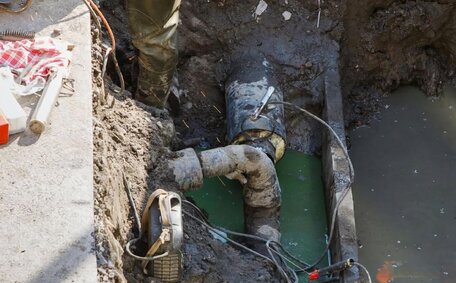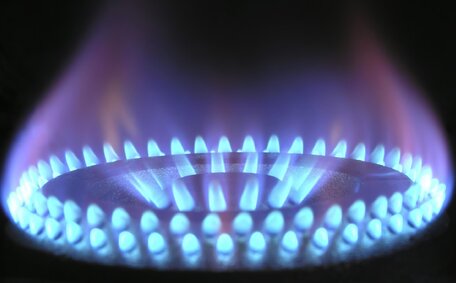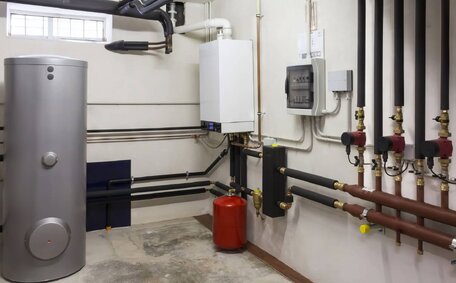
Sump Pump Failure Solutions
Sump pumps fail due to power outages, clogs, frozen pipes, and more. Prevent water damage by understanding causes and contacting plumbers for solutions to extend pump life.
Read MoreBegin by analysing your gas appliance energy usage through the energy rating labels on both your appliances and bills. This will highlight which devices consume more energy and inform your cost-saving strategies. Assess whether you need extended usage of items such as hot water systems, space heaters and gas cooking appliances.
Heating and air conditioning account for about 40 per cent of your home energy consumption in Australia, so focus first on the appliances used most.
Establishing a usage baseline allows you to measure the effectiveness of energy-saving strategies as they are implemented. This initial assessment ensures you target the appliances that will give you the best return on investment from upgrades or alterations.
Evaluate the age and efficiency of your gas appliances to thoroughly assess their current state.
Consider the age and service history of each appliance, since performance degradation over time can lead to elevated energy use. Identifying older, less efficient models helps in prioritising replacements to save energy.
Compare energy ratings. Choosing smarter appliances leads to significant savings over time.
Lower your air conditioner temperatures to effectively manage energy use and costs. For example, swapping a 2 star for a 5 star gas heater is more efficient, using less energy and can cut costs by about $300 yearly.
Prioritise upgrading your old appliances that consume the most energy for maximum benefits. Modern appliances such as tankless hot water systems or programmable thermostats often use less energy rather than relying on traditional models like space heaters and cooktops. Focus on these first for the quickest and most substantial impact.
To enhance the efficiency of existing gas appliances without replacing them, consider these practical steps:
Small routine adjustments are effective strategies for reducing energy consumption in our homes. An airtight home is proven to be more efficient than one with leaks, potentially slicing yearly gas heating bills by an enviable 10%. When coupled with efficient appliances, households can substantially curb expenditure.
Thermostats control your gas heating and determine the temperature maintained, providing an opportunity to save money on your energy bills. Adjusting the settings properly is a simple way to reduce electricity costs without compromising comfort.
Aim for 18°C to 20°C in living areas to achieve warmth while your hot water heat system uses less energy. Reducing your heating beyond 20°C can lower your energy bills, as each additional degree can increase costs by approximately 15%.
Bedrooms can be around 16°C overnight. So maintain modest settings which can also lower your costs.
Implement programmable thermostats to automatically reduce temperatures when you’re asleep or away, thus preventing the unnecessary heating of unoccupied spaces.
Check thermostat accuracy yearly using room thermometers. Make sure to reset as required so that the set and observed temperatures align. Contact professionals if self-adjustments don’t resolve inaccuracies.
Proper ventilation significantly affects the efficiency and safety of gas appliances. Ventilation systems expel harmful combustion byproducts and introduce fresh air.
Ensure vents aren’t obstructed by furniture or debris. Look for blockages, damage, and improper installations. Ventilation issues can be invisible to the naked eye.
Schedule annual professional inspections of your ventilation systems to ensure safety and efficiency.
Check range hoods function correctly while cooking. Upgrade to efficient electric models with higher extraction capacity if required. Consider including battery storage and battery-powered carbon monoxide alarms as part of your safety investment.
Sealing all external gaps is advocated by Sustainability Victoria as part of maintaining a more energy home environment, ensuring proper airflow around pipes and chimneys. Weatherstripping on doors and windows also helps optimise airflow.
Proper ventilation is a critical area where homeowners can take action to reduce risks and operating costs. Don’t neglect regular servicing and testing. Minor investments now prevent major problems later.
Checking for gas leaks regularly is crucial for safety and reducing energy waste. If you suspect a leak, check out immediate measures such as extinguishing all flames and turning off the gas supply. Ventilate the area immediately by opening doors and windows.
Detect leaks by listening for hissing sounds and smelling for gas odour around appliances and pipes.
Call a professional to inspect with leak detection fluid or advanced metres. Maintain a proactive approach by scheduling annual inspections for your appliances. This keeps maintenance on track and helps in identifying any issues at their inception, thus avoiding unexpected problems.
Left unresolved, leaks lower efficiency, hike bills, and risk serious hazards like explosions or carbon monoxide poisoning.
Weatherstripping doors and windows helps minimise drafts that could affect appliance combustion and ventilation. Ensure flues aren’t obstructed outdoors. It’s smart to install battery-powered carbon monoxide alarms as a safeguard against potential natural gas leaks.
Don’t neglect checks - small consistent leaks accumulate over time. A few safety steps now improve efficiency, air quality and prevent disastrous failures down the track.
Performing routine maintenance keeps gas appliances operating efficiently and safely. Simple, consistent maintenance translates into notable savings of money energy, whilst maximising the functionality of your appliances.
Take advantage of the maintenance guides available for your specific models and check and clean burner parts and filters monthly. Check that your dishwasher is full before operating a cycle and ensure your system’s vents and flues are clear. Have professionals service your heater and water heaters yearly - it extends lifespan by up to 5 years.
Fit tap aerators and low-flow showerheads to conserve water and enhance your home’s energy efficiency. When replacing old appliances, consider upgrading to energy-efficient washing machines that utilise cold water cycles for enhanced savings. An efficient showerhead replacement can save around $160 annually on energy and water costs.
Monitor appliance performance and inspect for leaks or abnormalities. Early detection of issues prevents costly repairs down the track. Stay vigilant with basic upkeep for energy savings and equipment longevity.
Replacing out-of-date, inefficient gas appliances with newer energy efficient appliances significantly curtails energy usage and cuts expenses. Compare energy rating labels when upgrading: Higher star ratings denote the most efficient appliances.
Plus, minimising fossil fuel consumption shrinks your carbon footprint - with gas accounting for 22% of Australia’s overall greenhouse gas emissions.
Target appliances used most first - hot water systems, space heaters, cooktops. Swap out 2-star for 5-star models for roughly $300 yearly savings. Upgrade laundry dryers from 2 to 3 stars to conserve over 500 kWh annually.
Opt for modern reversecycle air conditioners over gas where suitable, as they’re known for their reduced running costs and increased efficiency. Heat pump technologies, with reverse cycle features, now match or exceed gas heaters in performance. Consult experts to compare lifespan costs before deciding.
Replacing outdated appliances requires planning but yields significant savings and environmental benefits. Your wallet and the planet thank you!
When choosing between gas electric and induction appliances, consider upfront costs, energy efficiency, environmental impacts, safety, convenience and running expenses over the lifetime of the appliance.
When switching gas for electric heat pumps, you can heat water at running costs roughly slashed to half those associated with traditional gas systems. Heat pump technology makes electric options competitive on performance too - they now match or surpass comparably sized gas models.
Induction cooktops not only cost less in the long run but also reduce cooking time by heating faster and managing energy more efficiently compared to traditional gas appliances. To optimise energy use, keep the oven door closed and use it at lower temperatures for even cooking when necessary. Smart technology allows remote monitoring and control.
Electric appliances produce less greenhouse emissions, as Australia’s electricity grid continues to integrate renewables. No gas combustion equals reduced indoor air pollution, directly benefiting your health through improved air quality. Maintenance needs are typically lower too over time.
However electric and induction systems do involve much more than higher upfront costs. Consider total lifecycle expenses, not just purchase price. Consult experts to compare options suitability for your home.
Heat pumps and solar water heating systems offer money-saving, energy efficient alternatives that utilise less power than gas water heaters. Heat pumps are more efficient than traditional heating methods, using less power overall as they utilise electricity to transfer heat. Solar water heaters can use far less energy than traditional systems, relying on the sun’s renewable energy for zero-emissions heating.
Transitioning your home off gas to utilise heat pumps can result in cost savings over a lifetime, potentially amounting to about $2,500. Solar hot water cuts bills by about 50-75% while eliminating 1 tonne of carbon emissions yearly. Benefits extend community-wide as less gas consumption lowers Australia’s greenhouse footprint.
Though initial costs for these systems are higher, initiatives such as the ACT Government’s Sustainable Household Scheme help offset the initial investment. Focus first on swapping out gas hot water then supplement through rooftop solar panels and batteries to offset system electricity needs.
Maximise savings by combining heat pumps with solar power, which can offset peak electricity rates and allow for energy storage.
This transition also prevents 54kg of CO2 emissions per person from entering the atmosphere every year.
Seal air leaks and enhance insulation to prevent gas wastage, boost appliance efficiency and lower energy bills. When cool air seeps out through unsealed gaps, appliances are strained further to maintain comfortable temperatures, inadvertently raising your energy bill. Insulation prevents transferred heat between the inside and outside.
Check for leaks around doors, windows, ceilings, floors, electrical outlets/switches and vents.
Detect air leaks by listening for whistling sounds and feeling for drafts around your home. Secure flued gas heaters are correctly ventilated.
Upgrade insulation in walls, attics, basements and exposed pipes. Add insulative window film and thermal curtains. Get professional help assessing your home.
Choose insulation solutions such as batts, loose-fill, rigid boards, or spray foam according to each specific area of your home.
Proper sealing and insulation strategies help reduce energy consumption, potentially saving on usage by up to 25% and thus, diminishing emissions and costs. Contemplating what can I do to improve my home? Making air tightness and containment upgrades are priority steps before replacing appliances for maximum efficiency.
Simple upgrades like sealing air leaks or adding insulation can reduce bills by 25%. Replacing old appliances within Australian homes with energy-efficient models also delivers dividends in the long-term, despite higher initial costs.
Experience the financial and environmental benefits by upgrading from a 2-star to a 5-star gas heater, potentially saving about $300 yearly. Upgrading a 2-star clothes dryer to a 3-star one conserves over 500 kWh annually. Installing a heat pump or solar water heater slashes hot water heating expenses, as well as those for your washing machine, by 50-80% compared to gas systems.
Monitoring usage and tweaking habits nets savings too. Using lids on pots when cooking helps you use less energy on the burner. It all adds up.
Turning down thermostats 1C saves 15% on heating bills yearly. Letting your home heat naturally by opening blinds can minimise gas heater runtimes.
Though individual savings may differ, a general expectation is a 20-30% reduction in energy bills with efficiency enhancements, with cumulative annual savings offsetting the initial investment.
Efficiency helps curb emissions as well. Less gas combustion means smaller carbon footprints for homes and communities. Your wallet and the planet reap substantial rewards.
Explore methods to cut costs through rebates and incentives available in Cronulla for households upgrading to energy-efficient gas appliances.
Take advantage of the NSW government’s Sustainable Household Scheme, providing discounts on appliances such as energy-efficient fridges and TVs to enhance your home’s energy conservation. Eligibility extends to high-efficiency gas stoves and space heaters under this programme, advocating the use of more efficient equipment and promoting higher energy standards.
The NSW Climate Change Fund offers a discounted GreenSmart Home Service. An assessor will advise the most suitable energy-efficient gas appliance upgrades for your property and connect you with approved suppliers and installers.
At the federal level, the HomeBuilder programme grants support renovations that transition homes away from gas, fostering greater sustainability. Installing high-efficiency gas hot water systems, hydronic heaters, or cooktops paired with better insulation, ventilation or solar power can qualify.
Research all programmes available in your area thoroughly when planning your next appliance replacement. Combined incentives can cover over 50% of product and installation fees. Your expenditures pay back rapidly through energy savings of 40% or more.
Sump pumps fail due to power outages, clogs, frozen pipes, and more. Prevent water damage by understanding causes and contacting plumbers for solutions to extend pump life.
Read MoreIf your monthly gas bill rises suddenly for no clear reason, the cause could be a gas leak from old pipes or appliances. Contact your provider to investigate.
Read MoreScale buildup reduces the efficiency of hot water systems over time. Regular descaling helps remove this. Flush your system with vinegar or a descaling solution.
Read MoreCronulla, 2230 NSW
We will call back as soon as possible.




